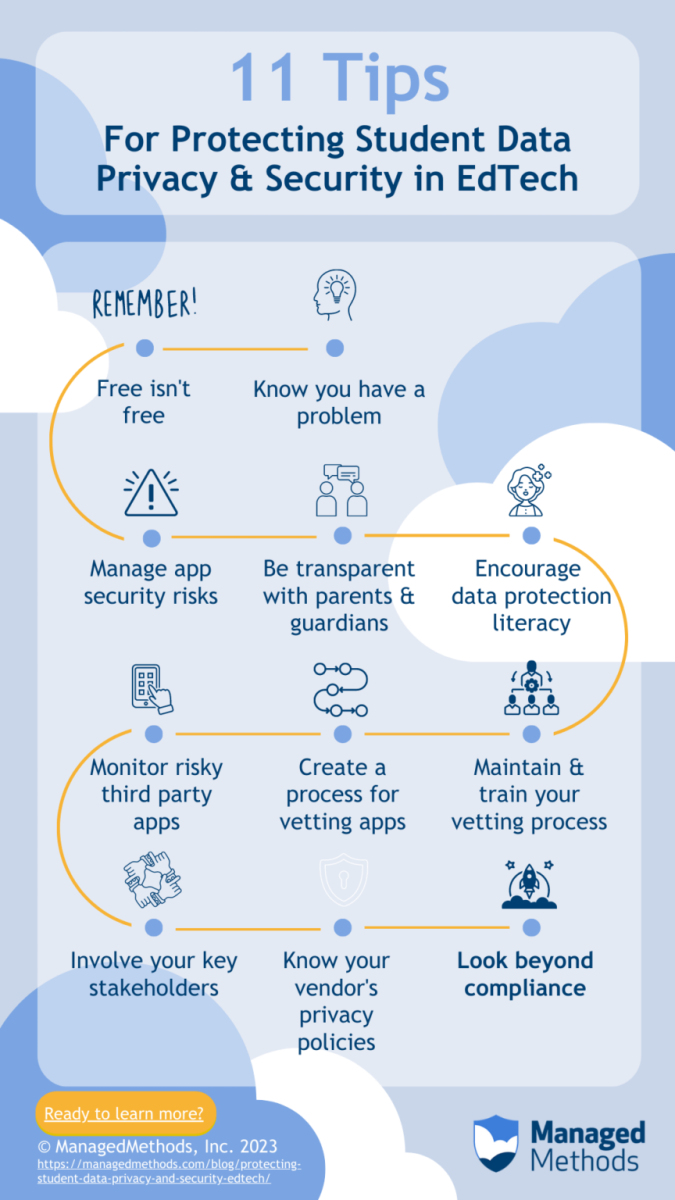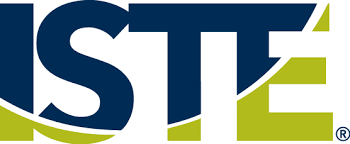![]()
National Data Privacy Day
January 28 is Data Privacy Day (DPD), an annual effort promoting data privacy awareness and education. This year’s DPD events, sponsored by the National Cyber Security Alliance (NCSA), focus on how to Own Your Privacy. The NCSA teaches users how to protect valuable data online, while encouraging businesses to Respect Privacy by protecting data they collect.
With the daily changes in technology, it can be difficult to teach students about Internet safety. It is important that as you teach with more and more technology in the classroom, students know the correct way to use the resources to ensure their safety. As more and more schools move toward 1 to 1 technology integration, it is crucial to help empower students to make safe, smart and ethical decisions online.
Social Media Do's and Don'ts for Teachers - Common Sense Education Infographic
Common Sense Media - Encouraging Digital Citizenship in 1:1 Environment
Tips for Protecting Student Data Privacy
Spotlight Resource!
Edutopia Media Literacy/Digital Citizenship tools
Media Literacy | EdutopiaFind and share resources to help students learn to analyze, evaluate, and communicate in a world with countless media sources and constant access to powerful computers.
Check out the resources, lessons, toolkits, and more from Edutopia! Materials cover topics from media literacy and technology integration to critical thinking and digital citizenship skills.
Lesson Plans
- FREE! K-12 Curriculum Digital Citizenship Curriculum - Common Sense Media Resources
- Middle-Level Curriculum and Activities - REMC Association of Michigan
-
NetSmartz Teacher Resources - Choose from a variety of topics and download videos, resource guides, presentations and activities to use in your own classroom
- Common Sense Media Lessons - This site provides a number of K-12 resources, curricula and plans to implement in your classroom to empower students to make safe, responsible decisions online
- Be Internet Awesome - Game and curriculum for teaching and learning about Internet Safety and Citizenship
- KidSmartz Teacher Tools - K-5 Teacher toolkit for classroom use
- Seesaw Ideas for Your Classroom - Digital Citizenship resources and activities to use in your classroom TODAY!
- Teaching Tolerance - Digital and Civic Literacy skills resources and lesson plans (tolerance.org)
- InCtrl - free, standards-based lesson materials that teach key Digital Citizenship topics and concepts (teachinctrl.org)
Additional Curriculum and Tools
Common Sense Media - Lessons in Action
DOJ "Protect Kids Online" Podcast Series
Educator Training
- Common Sense Educator Program - Become a certified Digital Citizenship educator through Common Sense Media
- NetSmartz Teacher Training - Online PD course for teaching Digital Citizenship
- Digital Teaching Webinars - A large collection of archived webinar videos to learn about teaching digitally as well as links to upcoming events you can participate in
Instructional Student Data Privacy Laws (what teachers should know)
Many school forms require personal and, sometimes, sensitive information… Your students' personal information is protected by law. Asking schools and other organizations to safeguard your students' information can help minimize their risk of identity theft. - Federal Trade Commission
Federal Privacy Laws:
-
US Department of Education:
- PPRA (Protection of Pupil Rights Amendment
- FERPA (Family Educational Rights & Privacy Act)
-
FERPA General Guidance for Parents - US Dept of Education
-
Federal Trade Commission:
- COPPA (Children’s Online Privacy Protection Act)
-
US Department of Health & Human Services:
- HIPAA (Health Insurance Portability & Accountability Act)
3 Privacy Laws teachers should be aware of (in simple terms from tech.ed.gov):
- FERPA is a Federal law that protects the privacy of student education records. The law applies to all schools that receive funds from the U.S. Department of Education. FERPA gives parents certain rights with respect to their children’s education records. These rights transfer to the student when he or she reaches the age of 18 or attends a school beyond the high school level.
- PPRA is intended to protect the rights of parents and students in two ways:
- It seeks to ensure that schools and contractors make instructional materials available for inspection by parents if those materials will be used in connection with an ED-funded survey, analysis, or evaluation in which their children participate; and
- It seeks to ensure that schools and contractors obtain written parental consent before minor students are required to participate in any ED-funded survey, analysis, or evaluation that reveals certain information.
- COPPA is set to place parents in control over what information is collected from their young children online. COPPA was designed to protect children under age 13 while accounting for the dynamic nature of the Internet. The Rule applies to operators of commercial websites and online services (including mobile apps) directed to children under 13 that collect, use, or disclose personal information from children, and operators of general audience websites or online services with actual knowledge that they are collecting, using, or disclosing personal information from children under 13. The Rule also applies to websites or online services that have actual knowledge that they are collecting personal information directly from users of another website or online service directed to children.
Wisconsin Data Privacy Links for Parents and Educators
- You Need Data to Personalize Learning - Data Quality Campaign
- Step-by-Step Guide to Understanding Student Privacy
- Student Data Privacy Overview Video (4 min)
- Parent Guide on Educational Data - Data Quality Campaign and National PTA
-
What Educators and Parents Think about Educational Data -Data Quality Campaign
-
US Department of Education Family Policy Compliance Office (FPCO)




